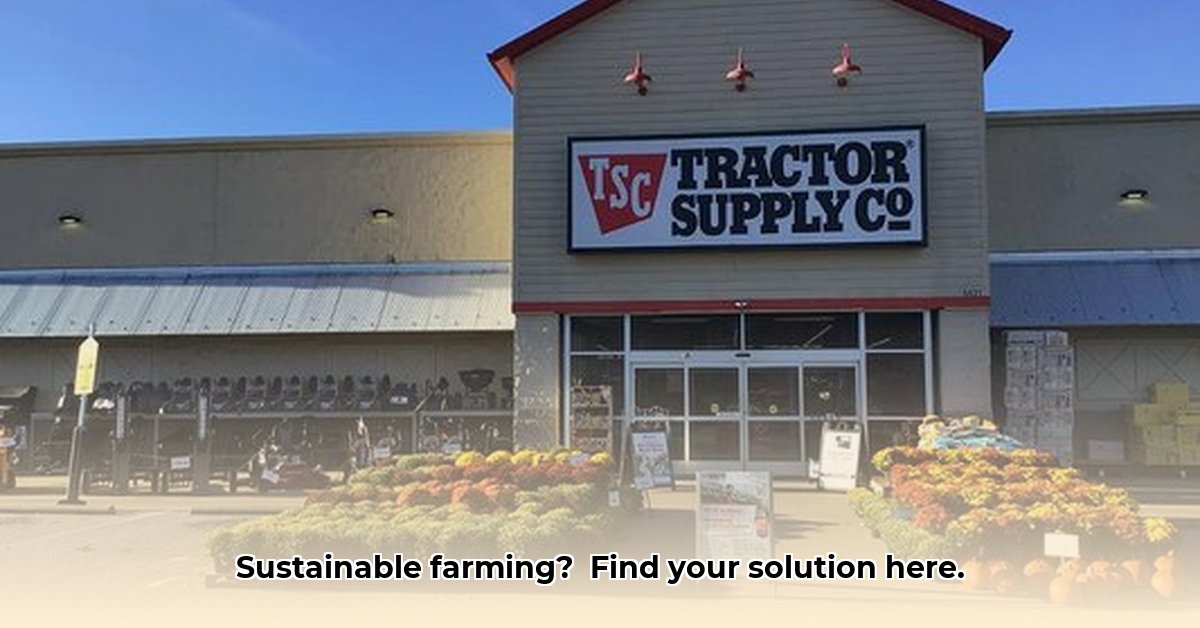
Tractor Supply Huntingtown MD: A Case Study in Sustainable Agriculture
This article examines Tractor Supply's Huntingtown, Maryland store, assessing its contribution to sustainable agriculture. We analyze its product range, accessibility, and sustainability practices, identifying both strengths and limitations, and offering actionable recommendations for all stakeholders. The analysis highlights the crucial role of transparency and proactive sustainability measures in fostering a more environmentally responsible agricultural sector. For more gardening tools, check out this helpful resource.
Tractor Supply's Product Range and Accessibility: A Convenient Resource for Local Growers
Tractor Supply's Huntingtown location offers a wide range of products relevant to sustainable agriculture. These include organic seeds, natural fertilizers, water-efficient irrigation systems, and composting supplies. The store's convenient location and extended hours provide readily accessible resources for local farmers and gardeners, potentially boosting efficiency and encouraging the adoption of sustainable practices. This readily available access to resources is a significant positive factor for environmentally-conscious agriculture. However, quantifying the exact influence of this accessibility on local farming practices requires further research. How many farmers have specifically adopted sustainable practices because of easy access to supplies? This remains an area needing further investigation.
Assessment of Sustainability Practices: A Need for Greater Transparency
While Tractor Supply offers a selection of products that support sustainable agriculture, a comprehensive assessment requires significantly more data. The company’s current transparency regarding sourcing, manufacturing processes, and product life-cycle impacts is insufficient. Key questions remain unanswered regarding the environmental impact of their product supply chain, from fertilizer production to packaging waste. Without comprehensive data relating specifically to their sustainability metrics, it's impossible to draw definitive conclusions about their overall contribution to sustainable farming. A lack of detailed information about their supply chain raises significant concerns, making it challenging to definitively assess their impact.
The Need for Sustainable Metrics: A Critical Missing Piece
Without precise metrics on things such as carbon emissions, water usage, waste generated, and ethical sourcing practices, it’s difficult for local farmers and consumers to make informed choices. This lack of data limits Tractor Supply's ability to showcase its commitment to sustainability and build trust with environmentally-conscious stakeholders. Furthermore, this limited transparency hinders external researchers and regulators from verifying and validating their sustainability claims.
Stakeholder Analysis and Actionable Recommendations: A Collaborative Approach
Effective progress towards sustainable agriculture requires a collaborative effort involving all stakeholders. This necessitates a detailed exploration of their respective roles and responsibilities.
Tractor Supply: Implement comprehensive sustainability reporting, including detailed information on sourcing, manufacturing processes, and waste reduction. Set ambitious, measurable goals for reducing the environmental footprint of their operations and product lifecycle.
Local Farmers & Gardeners: Actively seek out and utilize sustainably sourced products offered by Tractor Supply and other vendors. Adopt environmentally friendly practices, such as soil conservation, water-efficient irrigation, and crop rotation.
Local Government: Provide financial incentives and educational programs to encourage sustainable agricultural practices, specifically assisting local farmers in the transition to environmentally sound methods.
Consumers: Demand transparency and sustainability from retailers and producers. Support businesses dedicated to sustainable practices, including supporting local farmers’ markets and choosing sustainably sourced products.
Risk Assessment and Regulatory Implications: Mitigating Potential Challenges
Several risks are associated with Tractor Supply's operations concerning sustainability. These include reputational damage from a lack of transparency, potential non-compliance with increasingly stringent environmental regulations, and the indirect promotion of unsustainable farming practices. Mitigating these risks requires proactive implementation of best practices in waste management, environmentally friendly product sourcing, and stakeholder engagement coupled with a robust compliance program.
Conclusion: A Path Towards Sustainable Agriculture
Tractor Supply's Huntingtown store has the potential to play a significant role in supporting sustainable agriculture. However, realizing this potential necessitates a commitment to increased transparency, robust sustainability metrics, and collaborative action among all stakeholders. Further research is needed to comprehensively assess their environmental impact and develop concrete strategies for impactful positive change. The future of sustainable agriculture requires a joint commitment to transparency, collaborative action, and ongoing improvement.